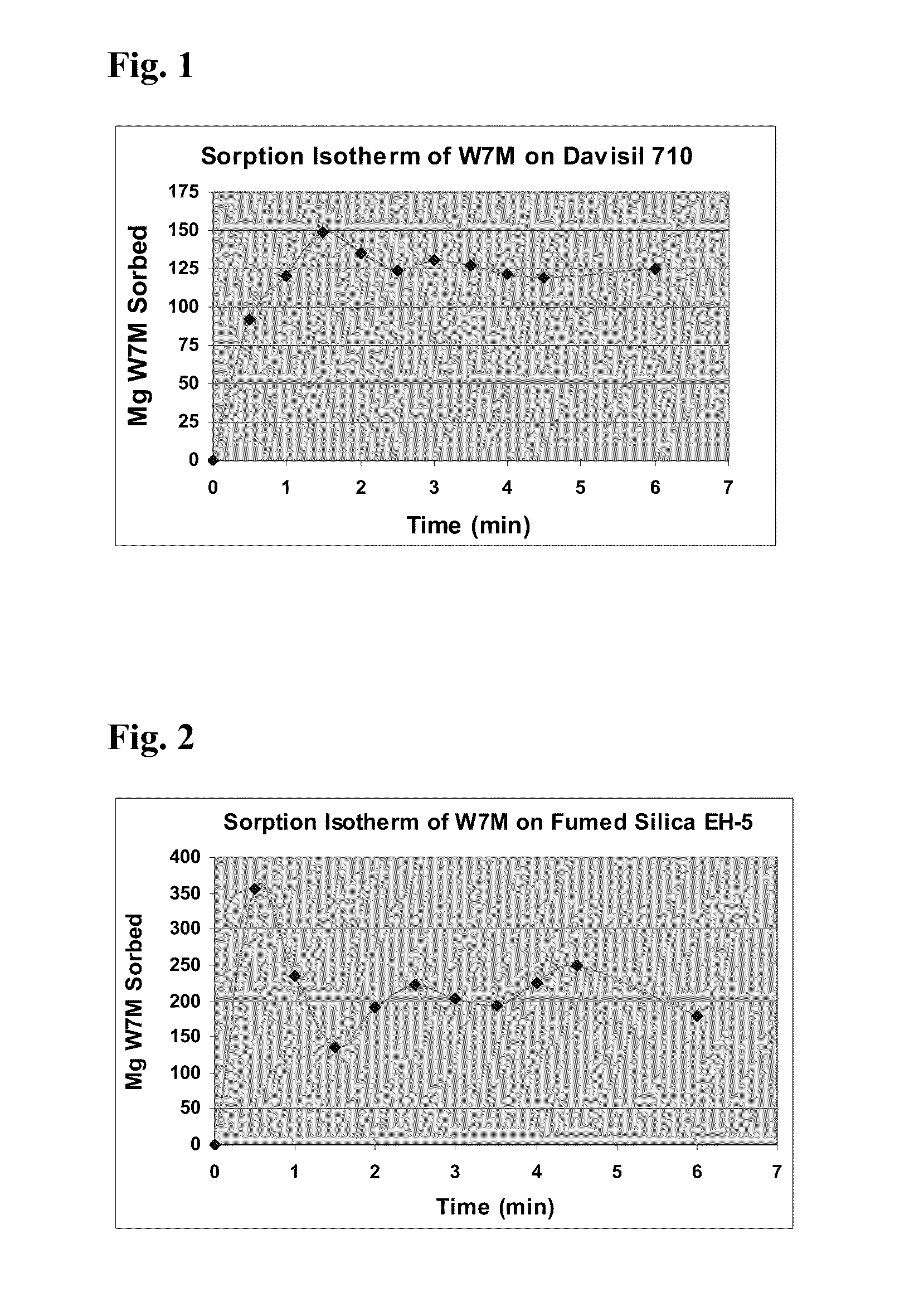Packaging Material Such as Film, Fiber, Woven and Nonwoven Fabric with Adsorbancy
a technology of adsorption and packaging material, which is applied in the field of compositions used in packaging, can solve the problems of increasing absorbance difficulty, achieve the effects of improving absorbency, reducing charge effect, and high surface area
- Summary
- Abstract
- Description
- Claims
- Application Information
AI Technical Summary
Benefits of technology
Problems solved by technology
Method used
Image
Examples
example 1
[0072]Two grams of a 4% aqueous solution of polyethylenimine (Aldrich Chemical #423475) is coated onto 5 grams of alpha cyclodextrin (Wacker Chemie W6) and again with 5 grams of methyl beta cyclodextrin (Wacker Chemie methyl beta CD, DS=1.2) The aqueous coated W6 and methyl beta CD cyclodextrins are dried at 105° C. After drying, the coated CD samples are ground to a fine powder by mortar and pestle. Tertiaryamine Dowex resins (Dowex SD-2, Dowex M-77 and MSA1 were tested as received. 1.0 gram of CD powder or Dowex resin is placed into a 250 mL serum bottle and sealed with PTFE / silicone septa screw cap. 250 mL sample bottles are challenged with 200 μL of ethylene gas (17,922 ppm) providing a 14.3 ppm ethylene headspace concentration. The samples were stored at 20° C.; at selected time intervals, the headspace is analyzed by GC / FID. Sorption is determined by difference from initially measured ethylene concentration and reference standards analyzed in parallel.
ExExDowex ™Dowex ™Dowex ™...
example 2
[0073]Four grams of three aqueous solution of polyethylenimine (Aldrich Chemical #423-475, 423-475 and 181978) is coated onto 2 grams of fumed silica (Cabot EH-5). The aqueous coated fumed silica is dried at 105° C. After drying, the coated silica samples are ground to a fine powder by mortar and pestle. 1.0 gram of powder is placed into a 250 mL serum bottle and sealed with PTFE / silicone septa screw cap. 250 mL sample bottles are challenged with 200 μL of ethylene gas (17,922 ppm) providing a 14.3 ppm ethylene headspace concentration. The samples were stored at 20° C.; at selected time intervals, the headspace is analyzed by GC / FID. Sorption is determined by difference from initially measured ethylene concentration and reference standards analyzed in parallel.
Example 2AExample 2BExample 2CMaterialsEH-5 Fumed Silica99.5% 98% 95%PEI (#423475) 0.5%PEI (#181978)2.0%PEI (#423475)5.0%Ethylene Sorption (μL / L-ppm) 4 hrs0.040.050.0324 hrs0.050.020.08
example 3
[0074]Two and one half grams of a 2, 6 and 12 wt. % aqueous solution of polyethylenimine (Aldrich Chemical #423-475, 423-475 and 181978) is coated onto 5 grams of methyl beta cyclodextrin (Wacker Chemie methyl beta CD, DS=1.2) The aqueous coated methyl beta CD cyclodextrins are dried at 105° C. After drying, the coated CD samples are ground to a fine powder by mortar and pestle. 1.0 gram of powder is placed into a 250 mL serum bottle and sealed with PTFE / silicone septa screw cap. 250 mL sample bottles are challenged with 200 μL of ethylene gas (17,922 ppm) providing a 14.3 ppm ethylene headspace concentration. The samples were stored at 20° C.; at selected time intervals, the headspace is analyzed by GC / FID. Sorption is determined by difference from initially measured ethylene concentration and reference standards analyzed in parallel.
Example 3AExample 3BExample 3CMaterialsmethyl beta CD, DS = 1.2 99% 95% 94%PEI(#423475)1.0%PEI (#423475)3.0%PEI (#181978)6.0%Ethylene Sorption (μL / L-p...
PUM
| Property | Measurement | Unit |
|---|---|---|
| Thickness | aaaaa | aaaaa |
| Area | aaaaa | aaaaa |
| Surface area | aaaaa | aaaaa |
Abstract
Description
Claims
Application Information
 Login to View More
Login to View More - R&D
- Intellectual Property
- Life Sciences
- Materials
- Tech Scout
- Unparalleled Data Quality
- Higher Quality Content
- 60% Fewer Hallucinations
Browse by: Latest US Patents, China's latest patents, Technical Efficacy Thesaurus, Application Domain, Technology Topic, Popular Technical Reports.
© 2025 PatSnap. All rights reserved.Legal|Privacy policy|Modern Slavery Act Transparency Statement|Sitemap|About US| Contact US: help@patsnap.com

